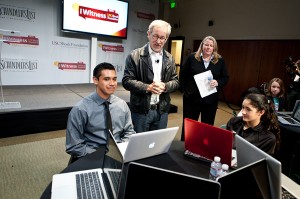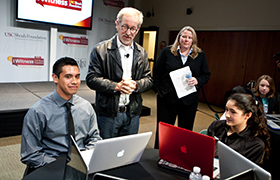Shoah Foundation initiative plans to raise $150 million
This week, the USC Shoah Foundation began its five-year, $150 million fundraising initiative to preserve the current Visual History Archive and fund other projects.
The announcement of the initiative was made at the Ambassadors for Humanity Gala in New York City on Oct. 3. The gala, which was hosted by Jon Stewart, also made headlines when it presented actor George Clooney with its Ambassador for Humanity award for his work in Darfur and Haiti among other places.
“We have three major areas that we are raising money for that includes education, research and access. Those are the overarching goals that our programs feed into,” said Steven Klappholz, executive director of development for the Shoah Foundation.
“The $150 million initiative is going to help establish an endowment fund for the foundation, preservation of the archives, support annual operations and capital projects.”
Founded in 1994 by Director Steven Spielberg following his work on the film Schindler’s List, the Shoah Foundation’s goal is to collect video testimony from survivors of the Holocaust and other genocides and preserve the accounts in a digital archive that can be used for education and research. The archive currently has approximately 52,000 testimonies and is expanding to include the genocides in Rwanda, Cambodia and Armenia in addition to the Holocaust.

Minority report · Director Steven Spielberg speaks with students at Chandler Middle School in Pasadena about the Shoah Foundation. Photo courtesy of Kim Fox Photography
“The basis of the fundraising effort is educating people about the scope and purpose of the foundation and asking them to join with us,” Klappholz said. “It really is a collaborative effort on behalf of the entire university.”
Fundraising for the Shoah Foundation is done in collaboration with the USC Dornsife Office of Advancement, which conducts the fundraising efforts including major gifts, corporate and foundation support, government grants and annual appeal letters.
Some of the ongoing programs the funds will support include iWitness, an online tool that allows students to search through video testimony based on a key theme or topic, as well as the continuing expansion of the video archives. The foundation is working to expand access points to the archives at other universities in the United States and around the world.
John Ingram, a junior majoring in sociology, interned for the Shoah Foundation in the spring of his freshman year after taking a freshman seminar offered by the foundation in the fall.
“It was great because it wasn’t just boring desk work,” Ingram said. “I was learning about and interacting with all these people’s experiences, and it was very empowering.”
One of the foundation’s main objectives is to empower educators to teach about such genocides by providing resources such as iWitness. During his time interning at the Shoah Foundation, Ingram utilized digital tools to help middle school teachers who are educating their students about the Holocaust. Ingram called his experience rewarding and said it gave him a better understanding of the human condition.
“Each individual matters, their personal stories and triumphs, how they persevered through [the genocide],” he said. “I remember one story of a man who saved 400 people, and he didn’t want any credit, he just did what he had to.”
Many Jewish students have called the foundation’s efforts crucial for preserving their heritage.
“USC’s commitment to Holocaust education is representative through the Shoah Foundation,” said Dylan Abrams, a sophomore majoring in psychology. “On countless occasions I’ve accessed the foundation’s database for projects, papers and for personal interest. I’ve heard a lot of [Holocaust survivor] testimony personally, and I know the importance of documenting it. The USC Shoah Foundation is the only organization in the world that is documenting it through video and on such a scale.”
For many, the Shoah Foundation is a place they can go to learn more about their ancestry.
“It’s an amazing organization. I’ve heard a half-dozen or so Holocaust survivors tell me their stories in person, but to have access to an archive like the Shoah Foundation’s is incredible,” said Benjamin Smith, a sophomore majoring in international relations and economics. “It’s like a key that unlocks a huge part of my culture’s history.”


I hope someday soon victims of the Nakba can add their testimonies as well.
Article 2 of the Convention adopted by the United Nations General Assembly in 1948 defines genocide as
…any of the following acts committed with intent to destroy, in whole or in part, a national, ethnical, racial or religious group, as such:
(a) Killing members of the group;
(b) Causing serious bodily or mental harm to members of the group;
(c) Deliberately inflicting on the group conditions of life calculated to bring about its physical destruction in whole or in part;
(d) Imposing measures intended to prevent births within the group;
(e) Forcibly transferring children of the group to another group.
— Convention on the Prevention and Punishment of the Crime of Genocide, Article 2